

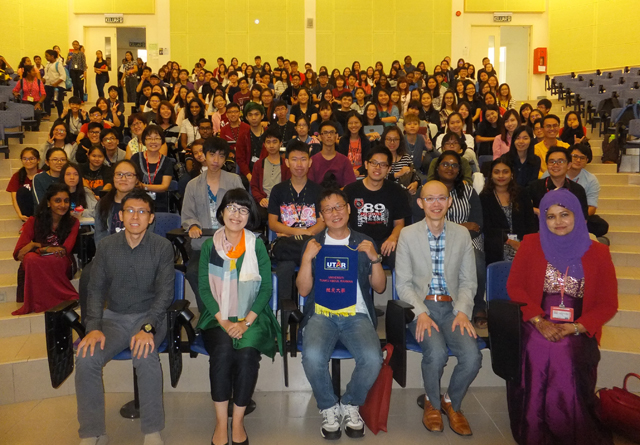
Front row: Dr Tan, Dr Naoko, Prof Fukukawa, Dr Ko and Dr M Sultana with the participants
A research seminar was organised by the Centre for Applied Psychology (CAP) of the Faculty of Arts and Social Science (FAS) on 3 July 2017 at the Kampar Campus.
The invited speakers from Japan were Prof Dr Yasuyuki Fukukawa from Waseda University, Assoc Prof Dr Ko Kaida from the National Institute of Advanced Industrial Science and Technology (AIST) and Assoc Prof Dr Naoko Kaida from The University of Tsukuba. Also present at the seminar were FAS’s Department of Psychology and Counselling Head Dr Tan Chee Seng and CAP Chairperson Dr M Sultana Alam, along with 220 participants, inclusive of staff and students.
First to enlighten the participants with cross-culture research knowledge was Prof Fukukawa, with his paper titled “Ageism in Asia: Examining attitudes towards older adults”. His study aimed to examine young persons’ attitudes and beliefs towards older adults in Asian countries, such as Japan, Malaysia and Philippines. With the focus on the nature of human mind, his study investigates the association between that nature and the negative attitude young people have towards older adults. Although his research is still in progress, the current result shows that the younger generations in Malaysia have overestimated the number of older adults in Malaysia.
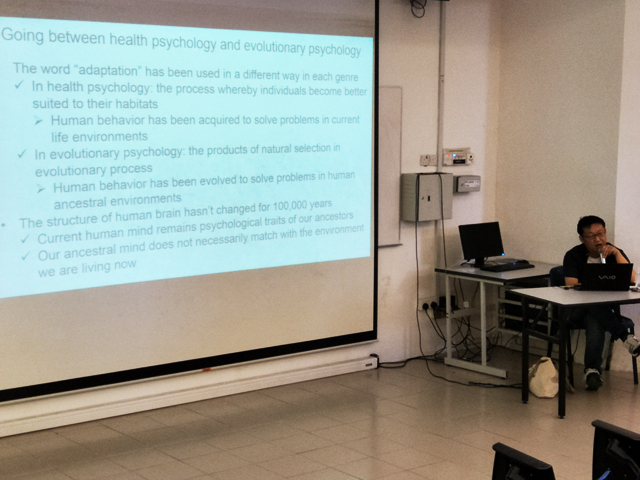
Prof Fukukawa explaining the difference between health psychology and evolutionary psychology
Dr Ko’s session elucidated to the participants on the perception and behaviours found in an individual when the person is sleepy. Through his study, titled “Wake up for the environment: An association between sleepiness and pro-environmental behaviour”, the relationship between sleepiness, pro-environmental behaviours, and the balance between optimism and pessimism ratio was identified. His results showed that individual with low sleepiness was less pessimistic and engaged in pro-environmental behaviours more frequently and vice versa, implying that sleepiness might hinder pro-environmental behaviours in daily life. His study also suggested that sleepiness, optimism and pessimism are important psychological factors for facilitating behaviours that are favourable to the society.
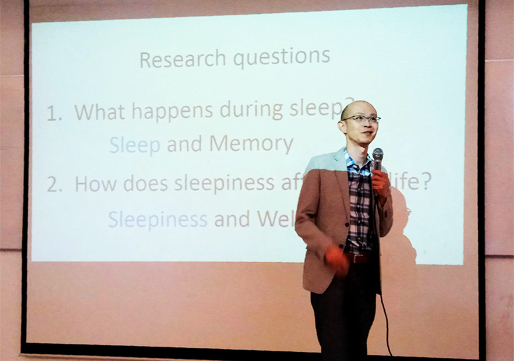
Dr Ko explaining the definition of sleep
Dr Naoko on her “Waste Perceptions and Behaviours in Malaysia and Japan: Cross-Cultural Implications from Questionnaire Surveys” paper provided participants with cross-cultural insights on the perceptions and behaviours found in an individual, in relation to waste issues, from the questionnaire data she collected from Japan and Malaysia.
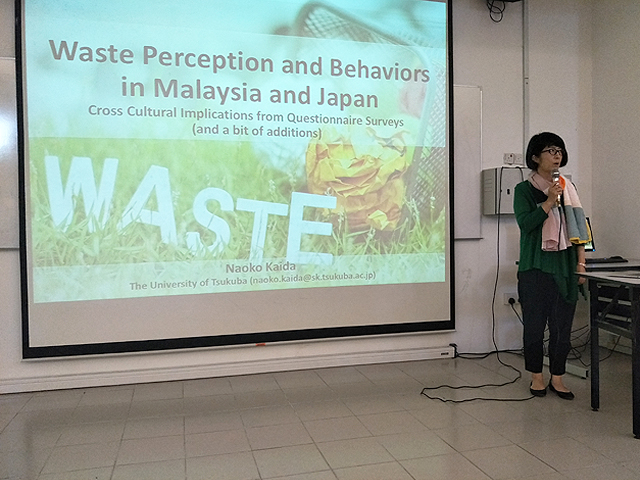
Dr Naoko explaining the difference of perceptions between Malaysians and Japanese
Her results showed that the lack of the environmental awareness is the major contributing factor to why Malaysians litter. Other Malaysians have also considered the insufficient number of bins, and the lack of systematic waste collection and treatment as reasons for littering. Among the Japanese however, Dr Naoko’s study showed that perceived enabling environment is the predominant factor for littering, followed by insufficient number of bins.
From the results obtained, Dr Naoko’s study suggested to raise environmental awareness among Malaysians and to control peer pressure among the Japanese as effective approaches to significantly reduce littering. Other approaches suggested were to provide sufficient bins in the respective countries and stimulate positive effects (hedonia and eudaimonia) to facilitate waste separation regardless of one’s values.
Being committed to the active scholastic research activities with publications of high international standard, and in line with the University’s commitment to research excellence, CAP members also held a meeting, prior to the seminar session, with the researchers to discuss the current social issues of both countries and exchange research ideas. The meeting also foresaw great opportunities for potential collaborations on future projects between students and the Japanese researchers as well.
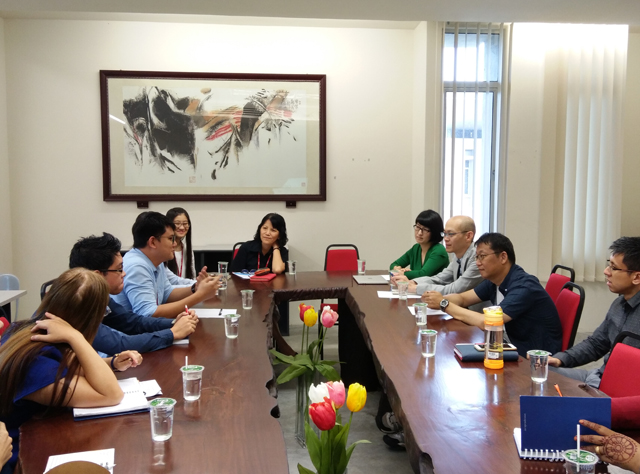
CAP members and the Japanese researchers discussing the latest social issues
With the meeting adjourned, the researchers were taken for a campus tour, where they visited the laboratories and studios of FAS, as well as making a stop at the library and the gallery. Dr M Sultana then presented tokens of appreciation to the researchers.
© 2019 UNIVERSITI TUNKU ABDUL RAHMAN DU012(A).
Wholly owned by UTAR Education Foundation Co. No. 578227-M LEGAL STATEMENT TERM OF USAGE PRIVACY NOTICE